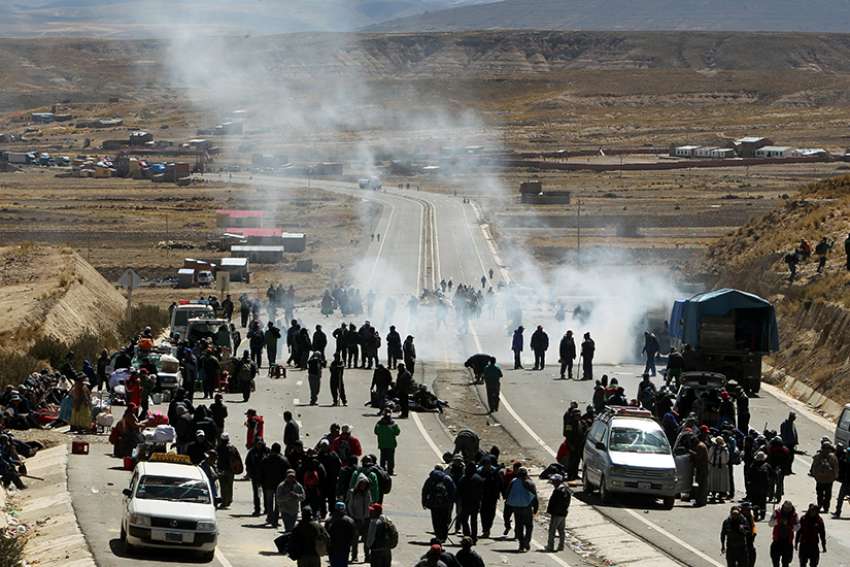Bolivian miners clash with police Aug. 11 during a protest along a road in Mantecani. Large-scale mining and extractive operations are failing to deliver economic benefits while causing environmental damages and human suffering throughout Latin America.
CNS photo/Martin Alipaz, EPA
Comment: It's through giving that our humanity is fully realized
By Glen Argan
The mountain ash tree in our front yard is at the peak of its autumn brilliance. I sit on the couch in our living room awed by the array of gold, green, yellow and red.
Every fall, I wait for that tree to show its splendour. Some years, strong winds come early and empty the mountain ash of its leaves before the colours reach their full glory.
This year, we are blessed. Perhaps I appreciate that blessing even more after our August visit to Bolivia.
Nora and I were part of a group of 14 Development and Peace supporters from Alberta and Manitoba who visited La Paz and the Altiplano region in western Bolivia to meet with D&P partners in that region.
There is much to say about what we encountered and so much that words cannot capture.
Bolivia is one of the poorest countries in the Americas, but one composed of gentle, but feisty people. We visited the fisherpeople at Lake Poopo, a former lake which has dried into a salt flat due to climate change and unsustainable demands on its watershed from industry and agriculture.
Our group went down into the depths of Bolivia’s largest tin mine where workers sacrifice a longer lifespan in order to make a decent wage today.
We learned about the prevalence of domestic violence and what some are doing to combat it. We met with domestic workers who formed unions to help improve their oppressive working conditions.
Above all, we saw the hope of the people striving to make a better way of life, a better country which treats everyone with dignity.
However, when I sat on my comfortable couch in Edmonton gazing at that mountain ash, I reflected on how fortunate many Canadians are. Fortunate simply to have a yard and a beautiful tree. Fortunate to live on a quiet street.
We take this for granted, yet how different it is from life in La Paz, Bolivia’s capital, and its twin city El Alto. Central La Paz teems with life, people flowing down the sidewalks and taxis jostling for position on the narrow, crowded streets.
Rural life is different, quieter, but the poverty and the effects of water shortages are palpable. One indigenous woman came up to a member of our group and whispered, “We need water.”
Although the people have little, they give generously. At one place where Development and Peace is supporting projects to increase the water supply for both livestock and gardening, we were greeted by a five-man Andean band of flutes and drums. Later, the women grabbed each of us by the hand and danced us over to their village.
While sitting in the afternoon shade, we were treated to a generous feast of fish and local vegetables. At the conclusion of our visit, the band escorted us back to our bus.
The red-carpet treatment had been afforded us by people who could not afford a carpet, but who wanted to express their gratitude for the support they receive from Development and Peace.
In his encyclical Caritas et Veritate, Pope Benedict XVI wrote, “The human being is made for gift which expresses and makes present his transcendent dimension” (n. 34). In Bolivia, our group witnessed the fullness of humanity in those who give when they have little with which they can part.
Back in Edmonton, I felt in awe of our great prosperity. Traffic is orderly, most vehicles are relatively new and trees flourish in our front yards while a garden grows in the back. We possess an abundant share of the gifts of creation, but it is in giving that our humanity is most fully realized.
Not everyone in Canada is fortunate. Far from it. Clean water is, for example, as much an issue on northern reserves as on the high plain of Bolivia. But on this Thanksgiving weekend, we do well to reflect on the reality that ours is one of the most prosperous and peaceful societies the world has ever known.
Those are gifts to treasure, but the greatest gifts are the ones we give to others.
Tagged under:
Please support The Catholic Register
Unlike many media companies, The Catholic Register has never charged readers for access to the news and information on our website. We want to keep our award-winning journalism as widely available as possible. But we need your help.
For more than 125 years, The Register has been a trusted source of faith-based journalism. By making even a small donation you help ensure our future as an important voice in the Catholic Church. If you support the mission of Catholic journalism, please donate today. Thank you.
DONATE

